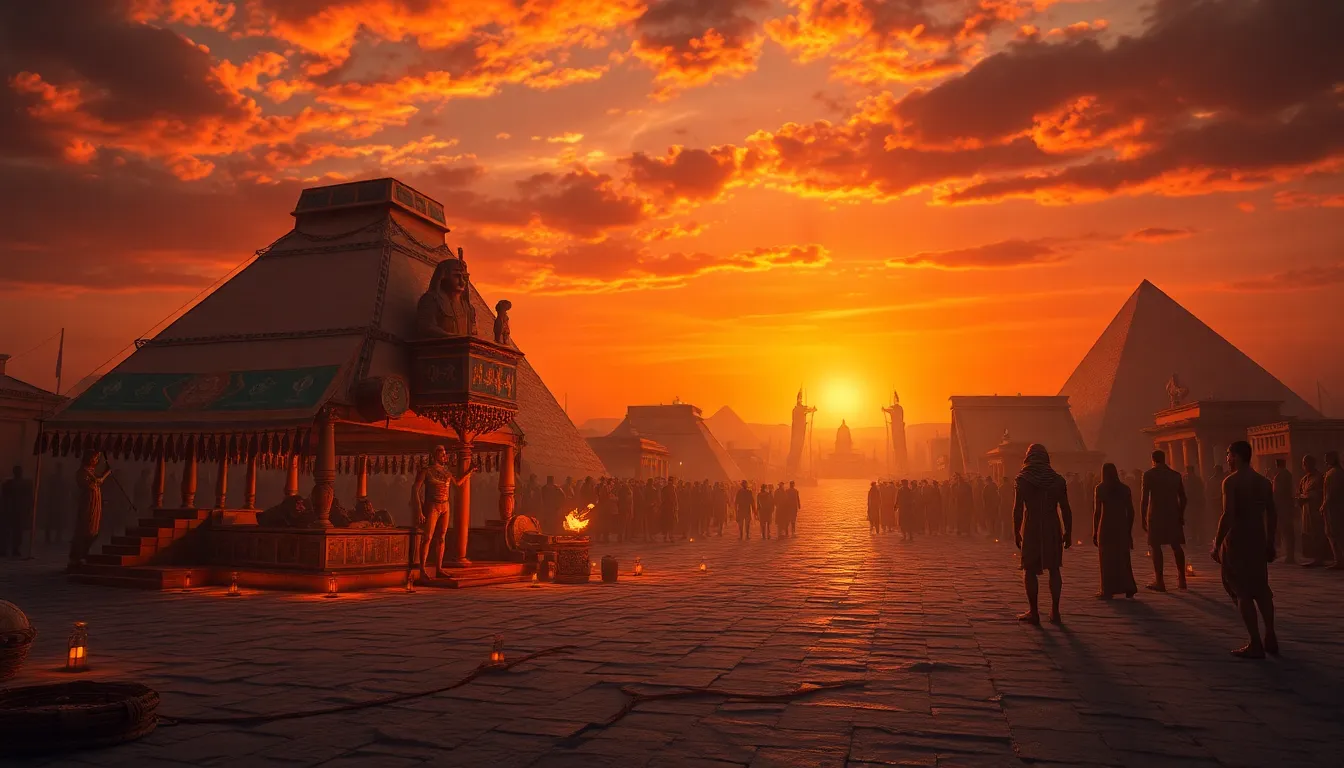The Influence of Egyptian Festivals on Modern Celebrations
I. Introduction
The ancient civilization of Egypt was rich with festivals that celebrated the gods, nature, and the cycles of life. These festivals were not merely social gatherings; they were deeply entrenched in the religious and cultural fabric of Egyptian society. From the joyous processions honoring the Nile’s flooding to sacred rituals paying homage to deities, each festival served to reinforce community bonds and spiritual beliefs.
This article aims to explore the impact of these ancient celebrations on contemporary festivities. By examining the historical context, themes, and evolution of Egyptian festivals, we will uncover how they continue to resonate in modern culture.
II. Historical Context of Egyptian Festivals
Key festivals in ancient Egypt played a crucial role in the lives of its people. Among the most significant were:
- Opet Festival: Celebrated annually in Thebes, this festival honored the god Amun and involved a grand procession from Karnak to Luxor.
- Wepet-Renpet: Known as the “Opening of the Year,” this festival marked the start of the agricultural season and was crucial for the renewal of life.
- Sed Festival: A royal jubilee that celebrated the pharaoh’s continued reign and vitality, ensuring the stability of the kingdom.
These festivals were not only occasions for celebration but also reinforced the cultural and religious significance of the gods, the cycles of nature, and the afterlife beliefs that permeated Egyptian society.
III. Themes and Elements of Egyptian Festivals
The rituals and ceremonies of Egyptian festivals were elaborate and varied, often involving:
- Offerings: Food, flowers, and incense were presented to deities to gain favor and blessings.
- Processions: Large gatherings that featured music, dancing, and the transport of sacred objects.
- Communal gatherings: Festivals were a time for communities to come together, fostering social cohesion and collective joy.
Symbolism and mythology were central to these celebrations. The gods represented various aspects of life, and festivals often symbolized:
- The renewal of life and nature, as seen in harvest festivals.
- The connection to the afterlife, where rituals ensured safe passage and favor from the gods.
- The importance of community and shared beliefs in maintaining social order.
IV. The Evolution of Festivals from Ancient Egypt to Modern Times
As dynasties rose and fell, the practices surrounding Egyptian festivals evolved. This transition involved:
- Adaptation of rituals to reflect changing religious beliefs and political structures.
- Preservation of certain traditions despite foreign influences, ensuring that essential elements remained intact.
Over centuries, while some festivals faded, others transformed, incorporating new elements while retaining their core significance.
V. Direct Influences on Modern Celebrations
Many modern festivals echo themes found in ancient Egyptian celebrations, including:
- Renewal: The idea of rebirth and regeneration is prevalent in festivals such as Easter and the Spring Equinox.
- Harvest: Celebrations like Thanksgiving and various harvest festivals honor the agricultural cycle, a key aspect of ancient Egyptian life.
- Community: Festivals today still emphasize gathering and sharing, much like their ancient counterparts.
Examples of modern festivals drawing inspiration from Egyptian traditions include:
- Midsummer celebrations that honor the sun, reminiscent of the sun god Ra.
- Harvest festivals that celebrate the bounty of the earth, echoing Wepet-Renpet.
VI. The Role of Egyptian Festivals in Contemporary Culture
In today’s world, the influence of Egyptian festivals can be observed in various cultural expressions:
- Art: Contemporary artists often draw inspiration from ancient Egyptian motifs and themes in their works.
- Music: Modern music festivals may incorporate elements of ancient rituals, using traditional instruments and styles.
- Performance: Dance and theater often reflect themes from Egyptian mythology, showcasing their enduring appeal.
There is a resurgence of interest in ancient practices, with many people seeking to integrate rituals and celebrations inspired by Egyptian culture into modern life. This revival highlights the relevance of these ancient festivals in fostering a sense of identity and connection to the past.
VII. Case Studies: Festivals with Egyptian Roots
Several modern festivals incorporate elements of Egyptian traditions. For instance:
- Festival of the Nile: Celebrated in various parts of Egypt, this festival highlights the importance of the Nile and includes traditional music, dance, and food.
- Summer Solstice Celebrations: Many cultures mark the solstice with festivals that celebrate the sun, akin to ancient Egyptian sun worship.
Interviews with festival organizers and cultural historians reveal that these celebrations aim to reconnect participants with their heritage and honor the traditions of their ancestors.
VIII. Conclusion
Throughout this exploration, we have seen how ancient Egyptian festivals have left a lasting imprint on modern celebrations. Key points discussed include the historical context of these festivals, their themes and rituals, the evolution of practices over time, and their direct influence on contemporary cultural expressions.
The enduring relevance of Egyptian festivals reminds us of the rich tapestry of human experience and the ways in which past traditions continue to shape our identities and celebrations today. As we honor these ancient practices, we also celebrate the shared humanity that connects us across millennia.




